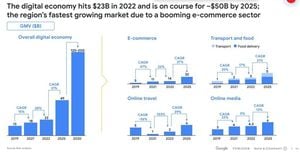Saudi Arabia has cemented its commitment to the global fight against polio by reaffirming its pledge of US$ 500 million to the Global Polio Eradication Initiative (GPEI) during the fourth Riyadh International Humanitarian Forum held on February 24, 2025. The signing ceremony featured prominent figures such as H.E. Dr. Abdullah al Rabeeah, Supervisor General of King Salman Relief and Humanitarian Centre, alongside Dr. Tedros Adhanom Ghebreyesus, Director-General of the World Health Organization, and other leaders from UNICEF, Gavi, the Gates Foundation, and Rotary International.
Initially pledged at the World Economic Forum Special Meeting hosted in Riyadh in April 2024, the funds are earmarked to help GPEI reach 370 million children annually with polio vaccines. Dr. Abdullah al Rabeeah expressed pride in Saudi Arabia's role, stating, “The world is on the path to eradicatng polio once and for all, and the Kingdom of Saudi Arabia is proud to be part of this global initiative.” This funding becomes even more significant as polio cases have seen over 99% decline since the GPEI's inception in 1988, though challenges remain due to humanitarian crises impacting vulnerable populations.
Dr. Tedros emphasized the importance of this contribution, noting, “Finishing the job requires unwavering determination,” underscoring the fragility of progress made so far. The return of polio cases to regions like Gaza demonstrates the persistent danger the virus poses to unvaccinated children worldwide. UNICEF Executive Director Catherine Russell supported this sentiment, highlighting how continued commitment and partnerships are key to safeguarding children's health from polio and other preventable diseases.
Meanwhile, Ghana took significant steps in renewable energy developments by commissioning a 50-megawatt solar power plant in Galgu, Yendi Municipality. This initiative spearheaded by the Bui Power Authority (BPA) and First Sky Limited aims to contribute to Ghana’s broader target of achieving 10% renewable energy by 2030. The commissioning ceremony featured BPA CEO Samuel Kofi Dzamesi, who articulated the project’s potential to bolster energy security and stimulate economic growth.
With the $59 million investment, the solar plant will directly feed electricity to the national grid. Officials believe this venture aligns with Ghana’s objectives to reduce fossil fuel reliance and create jobs within northern regions. The project also symbolizes the commitment to sustainable energy, setting the stage for greater future investments and advancements.
“This project will not only improve energy supply but also attract investment and create jobs,” noted Alhaji Shani Alhassan Saibu, Northern Regional Minister, advocating for the positive economic impact of the solar initiative.
On another front, tech giant Apple has announced a groundbreaking plan to invest more than $500 billion in the U.S. over the next four years, which includes hiring 20,000 new employees. This announcement follows discussions between Apple CEO Tim Cook and former President Donald Trump concerning tariffs on goods from China which could affect Apple's product costs.
Cook asserted confidence in America's innovation sector, stating, “We are optimistic about the future of American innovation, and we are proud to build on our longstanding investments,” highlighting the company's commitment to bolster American jobs and technology. Despite challenges posed by global production dynamics, including expansions outside China, Apple's significant investment reflects its strategy to solidify its operational footprint domestically.
During Trump's first term, he promoted Apple's production initiatives, which included manufacturing Mac computers within Texas, viewing these operations as emblematic of successful U.S. industry rehabilitation. Apple's latest investment is regarded as the company's largest commitment yet, shedding light on its efforts to contribute meaningfully to the American economy.
Collectively, these significant investments by Saudi Arabia, Ghana, and Apple depict formidable strides in ensuring public health, enhancing renewable energy capabilities, and reinforcing economic growth through job creation. Each initiative not only reflects individual organizational goals but also contributes to broader global efforts aimed at health, sustainability, and technological advancement.
These developments serve as timely reminders of the power and responsibility held by nations and corporations alike to drive impactful changes within their jurisdictions and beyond. By investing significantly, they reaffirm their roles as key players on global platforms.



